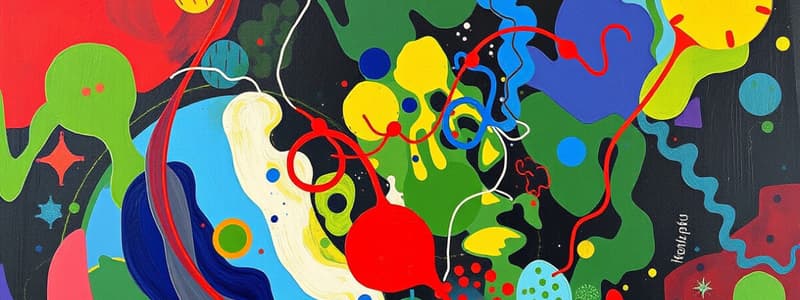Podcast
Questions and Answers
What is the electron transport chain?
What is the electron transport chain?
It is a process that employs electron carriers, hydrogen ions, and oxygen.
What does the electron transport chain produce?
What does the electron transport chain produce?
Large amounts of ATP.
What is a concentration gradient?
What is a concentration gradient?
The region over which there is a change in concentration of a substance.
What are cristae?
What are cristae?
What is the process by which oxygen is used during ATP production called?
What is the process by which oxygen is used during ATP production called?
What produces most of the ATP needed by a cell?
What produces most of the ATP needed by a cell?
Where does the electron transport chain take place?
Where does the electron transport chain take place?
What do proteins embedded in the cristae do?
What do proteins embedded in the cristae do?
What happens when hydrogen ions accumulate on one side of the membrane?
What happens when hydrogen ions accumulate on one side of the membrane?
How is ATP formed from ADP?
How is ATP formed from ADP?
What happens to the leftover hydrogen ions and electrons after ATP is created?
What happens to the leftover hydrogen ions and electrons after ATP is created?
How did the use of oxygen in cellular respiration change life on Earth?
How did the use of oxygen in cellular respiration change life on Earth?
What makes up cellular respiration?
What makes up cellular respiration?
Which process starts with the molecules NADH and FADH2?
Which process starts with the molecules NADH and FADH2?
Which process starts with glucose?
Which process starts with glucose?
Flashcards are hidden until you start studying
Study Notes
Electron Transport Chain Overview
- Utilizes electron carriers, hydrogen ions, and oxygen to generate large amounts of ATP.
- Indispensable for aerobic respiration, where oxygen is crucial for ATP production.
Mechanism of Action
- Occurs within the inner membrane of the mitochondria, specifically in the cristae, which maximize surface area.
- Hydrogen ions are actively transported across the membrane by embedded proteins, creating a concentration gradient.
- NADH and FADH2 donate electrons, contributing to the pumping of hydrogen ions, generating an imbalance.
Concentration Gradient
- A concentration gradient develops with high hydrogen ion concentration outside the membrane and low concentration inside.
- This gradient creates potential energy, with hydrogen ions ready to flow back through a carrier protein, generating ATP.
ATP Production
- As hydrogen ions flow back into the mitochondrial matrix, they drive the phosphorylation of ADP, converting it into ATP.
- This process exemplifies how biological membranes can utilize gradients to produce energy efficiently.
Waste Products and Oxygen's Role
- Oxygen combines with leftover hydrogen ions and electrons to form water, a crucial waste product of the process.
- The presence of oxygen allows for the efficient disposal of these byproducts and drives the continued production of ATP.
Evolutionary Impact
- The introduction of oxygen through photosynthesis significantly amplified the potential for energy production via cellular respiration.
- This evolutionary development enabled more complex life forms to emerge by increasing the available energy supplies on Earth.
Cellular Respiration Summary
- Cellular respiration encompasses glycolysis, the Krebs cycle, and the electron transport chain, all working together to convert glucose into usable energy (ATP).
Key Terminology
- Cristae: Folds of the inner mitochondrial membrane that enhance surface area for ATP production.
- Active Transport: Movement of hydrogen ions against their concentration gradient during the transfer of electrons.
- NADH and FADH2: Electron carriers derived from the Krebs cycle, initiating the electron transport chain.
Studying That Suits You
Use AI to generate personalized quizzes and flashcards to suit your learning preferences.




